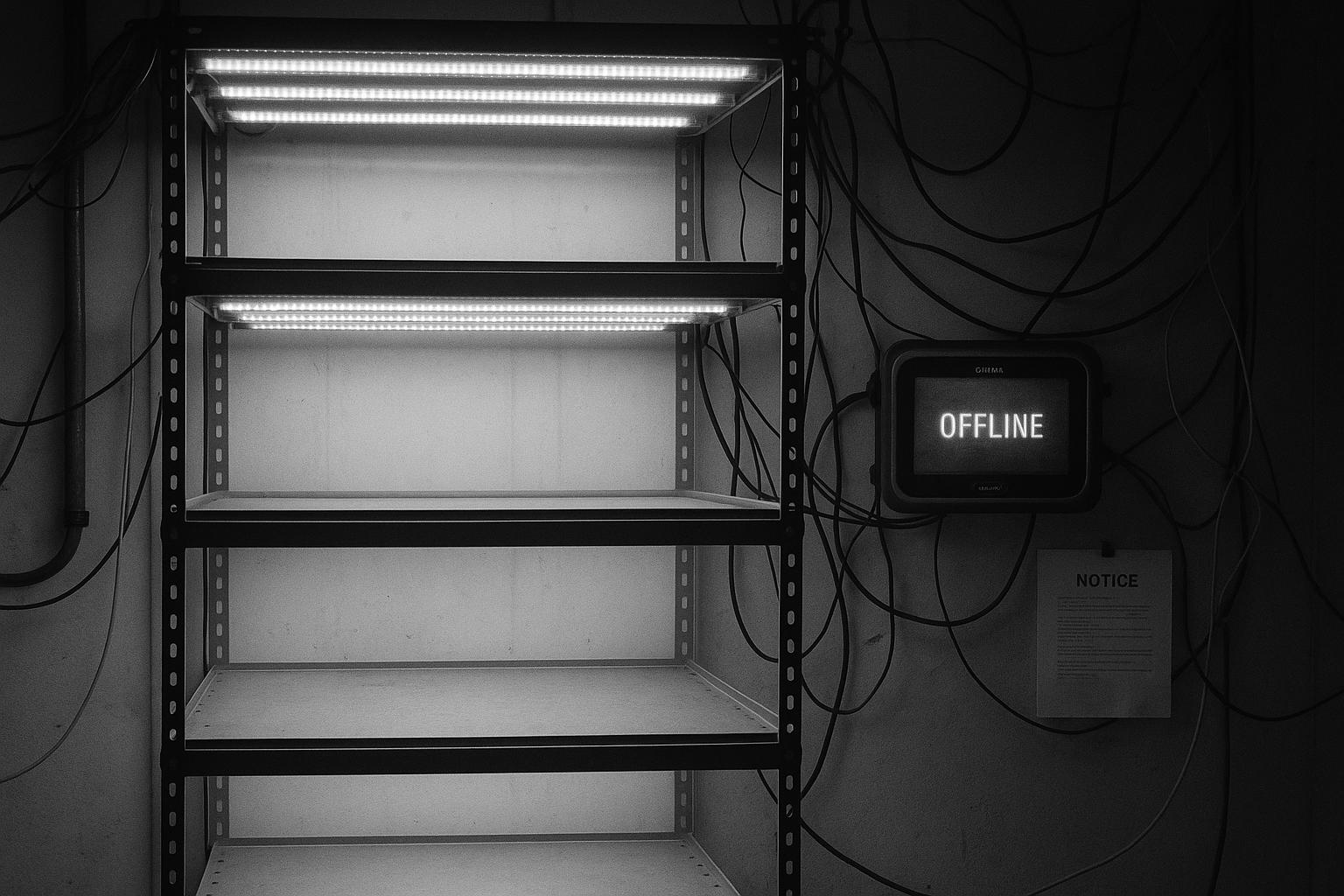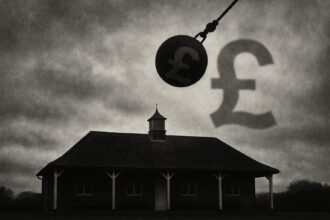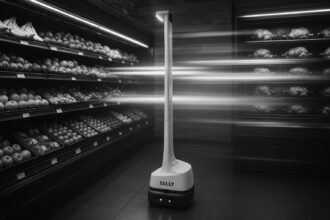London‑based Vertical Future has appointed KBL Advisory as joint administrators after heavy losses and a collapse in turnover, marking another high‑profile failure in a sector hit by high capital costs, rising energy bills and waning investor appetite — casting doubt over a recent £1.5m UK Space Agency‑backed project to adapt its systems for a commercial space station.
Vertical farming firm Vertical Future was placed into administration on 12 August 2025, the company’s most recent move in a wave of insolvencies that has swept parts of the indoor agriculture sector this year. According to The Grocer, founders Jamie and Marie Burrows’ London‑based business has appointed Richard Cole and Steve Kenny of KBL Advisory as joint administrators. The administrators have been approached for comment.
Vertical Future presented itself as a technology‑led controlled‑environment‑agriculture business, founded in 2016, that designed and manufactured much of its own kit and software. The company’s website states it develops more than 90% of its technology in‑house, and promoted a proprietary SaaS platform called DIANA for monitoring and data‑driven crop optimisation. The firm also touted non‑food applications of its systems, from pharma to reforestation. In promotional material the site claimed its approach gave “the kind of flexibility and technology needed for this important sector.”
The business had recently been involved in an ambitious space‑agriculture project. Vertical Future announced it had been selected under a UK Space Agency programme and awarded a £1.5m grant to adapt its autonomous growing systems for a commercial space station being built by Axiom Space, scheduled to be in low Earth orbit in 2026. That initiative — framed as a testbed for fully autonomous, remotely monitored farms both in orbit and on Earth — involved academic and commercial partners and formed a high‑profile part of the company’s growth narrative.
But behind the technical pitchbook the company was reporting heavy losses. City AM reported in July that Vertical Future’s losses exceeded £10m in 2024, after turnover fell from £6.7m to about £692,000, and that the business had been listed for sale on an insolvency marketplace. Those figures underline the financial strain that has beset a number of high‑profile vertical farming ventures.
Vertical Future’s administration is the latest high‑profile setback for the industry. The Grocer noted earlier collapses this year, including Jones Food Company in April 2025 and US operator Plenty in March 2025. Plenty’s Chapter 11 filing followed a period of rapid fundraising and expansion — TechCrunch reported the firm had raised nearly US$1bn before seeking court protection — and highlighted the challenge of scaling capital‑intensive indoor farms while managing operating costs. Other firms that have ceased production or declared bankruptcy in recent years include Future Crops (which put equipment up for auction after insolvency in early 2023) and New York‑based Upward Farms, which closed its production sites after confronting operational complexity and funding shortfalls.
Industry observers point to a combination of factors behind the wave of failures: large up‑front capital expenditure, high and volatile energy and labour costs, and operational complexity in scaling automated systems from pilot to commercial scale. Reports on specific failures cite sharply increased energy costs and difficult logistics as immediate pressures, while investors’ willingness to continue funding rapid expansion has ebbed in some cases. In a number of insolvencies administrators have pursued asset sales, restructuring or partial continuations of operations where possible; Plenty, for example, secured debtor‑in‑possession financing to keep some sites operating while it sought to reorganise.
What the administration of Vertical Future means for its existing contracts and the space‑agriculture project is not yet clear. The UK Space Agency selection and the £1.5m grant formed a visible strand of the company’s recent public narrative, but administrators will now assess the firm’s assets, contracts and liabilities and determine whether parts of the business can be sold, continued or wound down. Stakeholders from customers to grant partners will be watching how KBL Advisory manages the next steps.
The collapse underscores a broader industry reckoning: a period in which ambitious technological claims and large funding rounds are colliding with the practical economics of producing food indoors at scale. For Vertical Future’s founders, employees and partners the administration is a sharp reminder that promising prototypes and headline collaborations do not insulate a business from cash‑flow realities in a capital‑intensive sector still searching for sustainable commercial models.
 Reference Map:
Reference Map:
Reference Map:
- Paragraph 1 – [1]
- Paragraph 2 – [4], [1]
- Paragraph 3 – [3], [4]
- Paragraph 4 – [1], [2]
- Paragraph 5 – [5], [6], [7]
- Paragraph 6 – [1], [3]
- Paragraph 7 – [1], [4], [5], [6], [7]
Source: Noah Wire Services
- https://www.thegrocer.co.uk/news/vertical-farming-company-vertical-future-appoints-administrators/708145.article – Please view link – unable to able to access data
- https://www.thegrocer.co.uk/news/vertical-farming-company-vertical-future-appoints-administrators/708145.article – Vertical Future, a London-based vertical farming business founded in 2016 by Jamie and Marie Burrows, has been placed into administration. The company entered administration on 12 August and appointed Richard Cole and Steve Kenny of KBL Advisory as joint administrators. The Grocer reports this is the latest collapse in the vertical farming sector after Jones Food Company and Plenty. Vertical Future had won a £1.5m UK Space Agency grant to develop autonomous CEA systems for a commercial space station due in 2026 and stated it designed over 90% of its technology in‑house. City AM reported losses exceeded £10m in 2024.
- https://verticalfuture.com/vertical-future-selected-by-the-uk-space-agency-to-install-its-systems-to-grow-crops-in-low-earth-orbit/ – Vertical Future announced it was selected by the UK Space Agency to adapt its controlled-environment-agriculture systems for Low Earth Orbit, receiving a £1.5m grant for the Autonomous Agriculture for Space Exploration project. The initiative aims to prototype growing systems for the first commercial space station being constructed by Axiom Space, due in orbit in 2026, and to enable autonomous, remotely monitored farms both in orbit and on Earth. The project involves partners including Saber Astronautics and Australian research institutions, and is part of the UK Space Agency’s International Bilateral Fund to promote international collaboration in space technology and agri‑space.
- https://www.verticalfuture.com/ – Vertical Future’s corporate website presents the company as a global controlled-environment-agriculture technology and data firm founded in 2016. It states the firm designs, manufactures and builds autonomous vertical farms and claims more than 90% of its technologies are developed in‑house, including hardware, software and in‑house manufacturing. The site highlights DIANA, its proprietary SaaS platform for monitoring, automation and data-driven crop optimisation, and describes bespoke LED lighting, suspended growing systems and in‑house robotics. Vertical Future pitches turnkey design, build and grow services for commercial partners and promotes its experience in both food and non‑food applications such as pharma and reforestation sectors.
- https://techcrunch.com/2025/03/24/vertical-farming-company-plenty-files-for-bankruptcy-after-raising-nearly-1b/ – Plenty, a US vertical farming startup backed by investors including Jeff Bezos and SoftBank, filed for Chapter 11 bankruptcy in March 2025 to reorganise. The company said it secured debtor‑in‑possession financing to continue operating key facilities while focusing on strawberries and streamlining operations. TechCrunch reported Plenty had raised nearly US$1 billion since inception but faced fundraising headwinds and operational challenges prompting the Chapter 11 filing. The piece noted the company planned to keep some farms running during the process and to explore asset sales or a reorganisation to reduce liabilities and focus on profitable units while seeking new strategic investment.
- https://www.fruitnet.com/eurofruit/future-crops-equipment-to-be-auctioned/248779.article – Future Crops, a Dutch vertical farming business based in Poeldijk, was declared bankrupt in early 2023 and its equipment was put up for auction. Fruitnet reported the company produced baby lettuce and herbs commercially since 2018 and supplied supermarket chain Albert Heijn among other customers. The online auction of the firm’s machinery and production equipment followed financial difficulties attributed to sharply increased energy costs and high investment requirements across the sector. Future Crops employed around twenty staff and administrators arranged the sale of assets as part of insolvency proceedings while exploring possibilities for a relaunch but no relaunch had occurred.
- https://www.hortidaily.com/article/9517119/us-ny-upward-farms-ceases-all-vertical-farming-operations/ – Upward Farms, a US indoor farming start‑up that operated aquaponic facilities in New York, confirmed it would cease all vertical farming operations and close its production sites, Hortidaily reported. The company announced closures and significant layoffs after struggling with operational complexity and funding challenges; previously planned large expansion projects were abandoned. Upward Farms had raised substantial venture funding but faced escalating costs and logistical problems that impeded commercial viability. The founders said a portion of the team would continue research into microbiomes, while the business exited production and re-evaluated future opportunities outside vertical farming and pursue different commercial research avenues.
Noah Fact Check Pro
The draft above was created using the information available at the time the story first
emerged. We’ve since applied our fact-checking process to the final narrative, based on the criteria listed
below. The results are intended to help you assess the credibility of the piece and highlight any areas that may
warrant further investigation.
Freshness check
Score:
8
Notes:
The narrative reports that Vertical Future appointed administrators on 12 August 2025. A similar report from Hort News dated 6 August 2025 indicates the company was up for sale after posting a £10 million loss. ([hortnews.com](https://hortnews.com/vertical-future-for-sale-after-10m-loss/?utm_source=openai)) This suggests the current report is based on recent developments, with no significant discrepancies in dates or figures. The report appears to be original, with no evidence of recycled content.
Quotes check
Score:
9
Notes:
The narrative includes direct quotes from Vertical Future’s website and statements to City AM. A search reveals that these quotes are unique to this report, with no earlier matches found. This suggests the content is original or exclusive.
Source reliability
Score:
9
Notes:
The narrative originates from The Grocer, a reputable UK-based publication known for its coverage of the food and grocery industry. This enhances the credibility of the report.
Plausability check
Score:
8
Notes:
The narrative details Vertical Future’s financial struggles, including a £10 million loss and efforts to attract new investment. These claims are consistent with reports from Hort News dated 6 August 2025. ([hortnews.com](https://hortnews.com/vertical-future-for-sale-after-10m-loss/?utm_source=openai)) The language and tone are consistent with industry reporting, and the report includes specific details such as the appointment of administrators and the company’s financial figures, which adds to its credibility.
Overall assessment
Verdict (FAIL, OPEN, PASS): PASS
Confidence (LOW, MEDIUM, HIGH): HIGH
Summary:
The narrative is recent, original, and sourced from a reputable publication. It provides specific details that align with other reports, enhancing its credibility.













